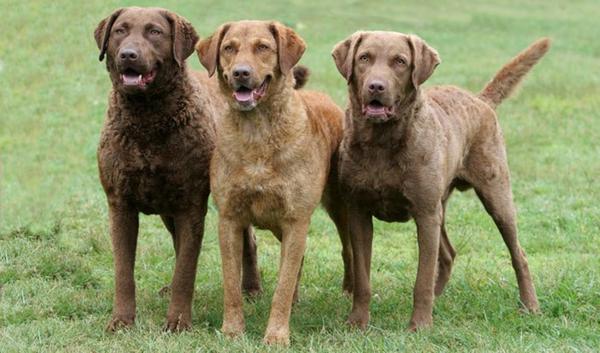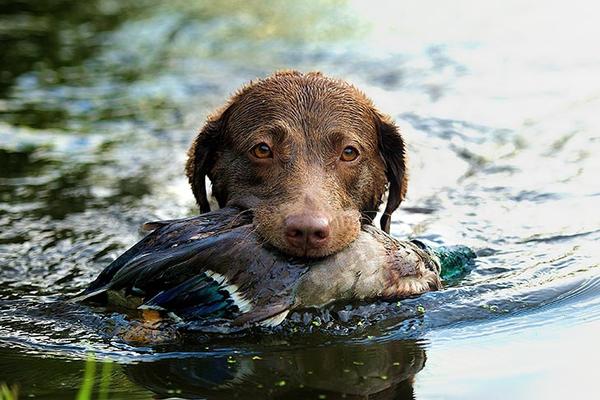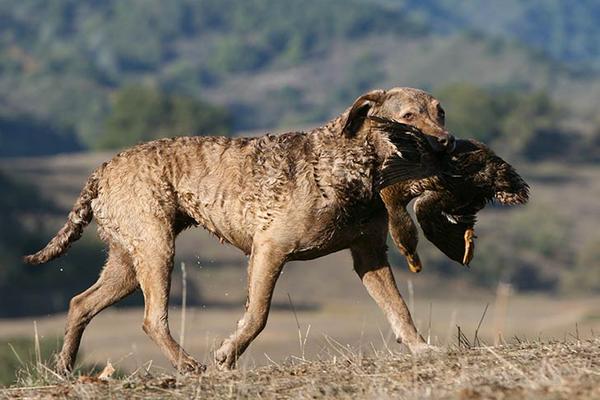Chesapeake Bay Retriever
also known as Chesapeake, Chessie, CBR

 History
History
The breed's name, "Chesapeake Bay Retriever," comes from the Chesapeake Bay region where it was developed. The breed was created by American sportsmen in the late 19th century, who sought a versatile hunting dog that could work in the harsh conditions of the Chesapeake Bay region. The Chesapeake Bay Retriever is known for its exceptional retrieving abilities in water and its thick, oily coat that protects it from the cold and icy waters of the Chesapeake Bay.
A man named George Law, who lived in the 19th century. He is considered one of the founders of the Chesapeake Bay Retriever breed and is known for having rescued two puppies from a shipwreck on the Chesapeake Bay. These puppies, a male named Sailor and a female named Canton, were the foundation of the Chesapeake Bay Retriever breed.
They were originally called "Chesapeake Bay Ducking Dog" because of their ability to retrieve waterfowl from the Chesapeake Bay. However, the name was later changed to "Chesapeake Bay Retriever" to reflect the breed's versatility as a hunting dog.
The Chesapeake Bay Retriever was officially recognized by the American Kennel Club (AKC) in 1878. Since then, it has also been recognized by several other kennel clubs and organizations around the world. Some of these include:
The Canadian Kennel Club (CKC) which recognized the breed in 1879.
The United Kennel Club (UKC) which recognized the breed in 1921.
The Australian National Kennel Council (ANKC) which recognized the breed in 1948.
The New Zealand Kennel Club (NZKC) which recognized the breed in 1955.
The Fédération Cynologique Internationale (FCI) which recognized the breed in 1955.
Breed Information
Is Chesapeake Bay Retriever a purebred?
Purebred
How do you pronounce the Chesapeake Bay Retriever name? How do you say Chesapeake Bay Retrievers?
ches-uh-peek bey ri-tree-ver
What were Chesapeake Bay Retrievers originally used for?
Water retriever
How Long Do Chesapeake Bay Retrievers Live? What is average life expectancy for a Chesapeake Bay Retriever? How long can Chesapeake Bay Retrievers live?
10-13 years
The average Chesapeake Bay Retriever lifespan is somewhere between 10-13 years, provided they aren't beset by any exceptional health issues or injuries.
Chesapeake Bay Retriever Height & Weight
How big is a full grown Chesapeake Bay Retriever?

| Height | ||||
|---|---|---|---|---|
| Average | 6 months | 12 months | 18 months | |
| Male | 23-26 inches (58.4 - 66 cm) | 16.5 inches (41.9 cm) | 20.5 inches (52.1 cm) | 24.5 inches (62.2 cm) |
| Female | 21-24 inches (53.3 - 61 cm) | 15.5 inches (39.4 cm) | 19.0 inches (48.3 cm) | 22.5 inches (57.2 cm) |
| Weight | ||||
|---|---|---|---|---|
| Average | 6 months | 12 months | 18 months | |
| Male | 65-80 pounds (29 - 36 kg) | 37.5 pounds (17 kg) | 55.0 pounds (25 kg) | 70.0 pounds (32 kg) |
| Female | 55-70 pounds (25 - 32 kg) | 30.0 pounds (14 kg) | 45.0 pounds (20 kg) | 60.0 pounds (27 kg) |
Do Chesapeake Bay Retrievers get fat easily?
![]()
![]()
![]()
![]()
![]()
The Chesapeake Bay Retriever is a breed that has an average to high tendency to gain weight if their weight is not closely monitored. It is important to maintain a balance between exercise and food intake to keep them at a healthy weight. This can be achieved by scheduling at least one daily walk and engaging in regular playtime with them.
Are Chesapeake Bay Retrievers Hypoallergenic?
No
Unfortunately, the Chesapeake Bay Retriever is not hypoallergenic, making it not a good choice for a dog lover who suffers from pet allergies.
What is a Chesapeake Bay Retriever personality? What are Chesapeake Bay Retriever dogs best known for?
Happy
Dominant
Protective
Affectionate
Intelligent
Quiet
Are Chesapeake Bay Retrievers heavy shedders? How Much Does a Chesapeake Bay Retriever Shed?
![]()
![]()
![]()
![]()
![]()
Chesapeake Bay Retriever dogs are not heavy shedders, but they will lose a significant amount of hair each year. To decrease the amount of shedding, you can regularly brush your Chesapeake Bay Retriever. This will remove loose hair and keep his coat growing in the same direction.
What is the watchdog ability of a Chesapeake Bay Retriever dog?
![]()
![]()
![]()
![]()
![]()
The Chesapeake Bay Retriever dogs are average watchdogs. If they sense something different, this breed will alert their owner.
Breed History
Where do Chesapeake Bay Retrievers come from?
United States
What are Chesapeake Bay Retrievers descended from?
Newfoundland dog
What organizations or kennel clubs recognize/register the Chesapeake Bay Retriever breed?
American Canine Registry
American Kennel Club
America's Pet Registry
Canadian Kennel Club
Dog Registry of America Inc.
Federation Cynologique Internationale
Kennel Club of Great Britain
North American Purebred Registry, Inc.
American Canine Association, Inc.
Australian National Kennel Council
Continental Kennel Club
National Kennel Club
New Zealand Kennel Club
United Kennel Club
When were Chesapeake Bay Retrievers first bred? How old is the Chesapeake Bay Retriever breed?
1800s
What Breed Group is a Chesapeake Bay Retriever?
Sporting (AKC:1878)
Gundog (UKC)

Chesapeake Bay Retriever Appearance
What color are Chesapeake Bay Retriever eyes?
Brown
Amber
What color can Chesapeake Bay Retriever nose be naturally?
Brown
What color can Chesapeake Bay Retriever coat be naturally?
Brown
Red
How long is a Chesapeake Bay Retrievers coat?
![]()
![]()
![]()
![]()
![]()
The coat of a Chesapeake Bay Retriever dog ranges in length from short to medium.
How Dense Is The Chesapeake Bay Retriever Coat?
![]()
![]()
![]()
![]()
![]()
What is the texture of the hair of a Chesapeake Bay Retriever?
Wavy
How many puppies can a Chesapeake Bay Retriever have in a litter? How many puppies can a Chesapeake Bay Retriever have in her first litter?
10-13 puppies per pregnancy
A Chesapeake Bay Retriever can have a litter of 10-13 puppies on average. However, it's worth noting that the size of the litters can vary greatly. Factors that can influence litter size include the health of the mother, breeding history, and genetics.
![]()
![]()
![]()
![]()
![]()
Chesapeake Bay Retriever dogs generally adapt well to changes in lifestyle and different living environments, but it is considered as an average level of adaptability compared to other breeds.

Chesapeake Bay Retriever Health Issues
Do Chesapeake Bay Retrievers have a lot of health problems?
![]()
![]()
![]()
![]()
![]()
The Chesapeake Bay Retriever is generally considered to be healthy. However, like all breeds, they are susceptible to certain health issues and it is important to keep an eye out for them and address them with your veterinarian as needed.
What are the major health concerns to be aware of when owning a Chesapeake Bay Retriever?
Hip Dysplasia
What are the less significant issues to keep in mind when it comes to Chesapeake Bay Retrievers?
Progressive Retinal Atrophy
Cataracts
Von Willebrand's Disease
Alopecia
What are the occasional tests recommended for Chesapeake Bay Retriever breed?
Eye
Hip
Blood
Dna For Vwd
Physical Examination

Chesapeake Bay Retriever Needs and Activities
Do Chesapeake Bay Retrievers have a lot of energy?
![]()
![]()
![]()
![]()
![]()
Chesapeake Bay Retrievers are high-energy dogs, thus an active lifestyle suits them well.
Do Chesapeake Bay Retrievers need socialization? How social are Chesapeake Bay Retrievers?
![]()
![]()
![]()
![]()
![]()
Chesapeake Bay Retrievers have average social needs compared to other breeds. They are known to be less active and independent than other breeds, and they are content with spending time alone and with their human family.
How much exercise should Chesapeake Bay Retrievers get?
![]()
![]()
![]()
![]()
![]()
The Chesapeake Bay Retriever needs a high level of physical activity to maintain a healthy lifestyle. They also make great companions for people who lead an active lifestyle and enjoy running, hiking or other outdoor activities. These breeds are not suitable for people with sedentary lifestyle or those who live in small apartments
How much sleep should a Chesapeake Bay Retriever have? Do Chesapeake Bay Retrievers sleep a lot?
![]()
![]()
![]()
![]()
![]()
Chesapeake Bay Retrievers are active dogs that don't require as much sleep as other breeds. However, they still need enough sleep to stay healthy.
Does a Chesapeake Bay Retriever drool a lot?
![]()
![]()
![]()
![]()
![]()
The Chesapeake Bay Retriever is known to be an average drooler among dog breeds. Drooling is the unintentional flow of saliva outside of the mouth and can be a normal characteristic of certain breeds or it can be a sign of a health problem. In the case of the Chesapeake Bay Retriever, it is a normal part of their physiology, however it is important to keep an eye on the amount of drooling and any changes in drooling patterns, as excessive drooling can be an indication of an underlying health issue and should be checked by a veterinarian.
How much does it bark?
![]()
![]()
![]()
![]()
![]()
Chesapeake Bay Retrievers tend to bark moderately, they bark when necessary, such as to alert their owner or to communicate something. They may also bark due to certain triggers like fear, alarm, boredom, greeting, separation anxiety and compulsive barking.
Do Chesapeake Bay Retrievers exhibit aggressive behavior to safeguard their home and territory? Do they possess a natural tendency to guard?
![]()
![]()
![]()
![]()
![]()
Chesapeake Bay Retriever dogs are known for being average at defending. They possess the capability to defend their territory or owners, but it is not their primary trait. They are not the best choice for guard dogs
Are Chesapeake Bay Retrievers mouthy?
![]()
![]()
![]()
![]()
![]()
What is the likelihood of a Chesapeake Bay Retriever running away? Do they have a tendency to explore or wander frequently?
![]()
![]()
![]()
![]()
![]()
Do Chesapeake Bay Retriever dogs have a high prey drive?
![]()
![]()
![]()
![]()
![]()
What do Chesapeake Bay Retrievers enjoy doing? How do I keep my Chesapeake Bay Retriever busy?
Walk, Run, Fetch
What is the energy level of a Chesapeake Bay Retriever? How much energy does a Chesapeake Bay Retriever have?
High
Chesapeake Bay Retrievers are high-energy dogs. They need mental as well as physical exercise. These dogs require a lot of your involvement and without it they can, and will, become problematic dogs.
![]()
![]()
![]()
![]()
![]()
How far should a Chesapeake Bay Retriever walk each week? How many miles should a Chesapeake Bay Retriever walk every week?
14 miles / week
There's really no limit to how far you walk your dog as long as they're comfortable. For Chesapeake Bay Retriever, it's at least 14 miles / week. Just remember to build distance and stamina gradually over time.
How much a Chesapeake Bay Retriever should exercise a day? How much activity does a Chesapeake Bay Retriever need?
90 minutes
In general most Chesapeake Bay Retrievers usually need at least 90 minutes of exercise daily. This can be spread across the day and include all sorts of high-energy activities, like walking, running and playing.
What level of grooming should be provided for a Chesapeake Bay Retriever?
![]()
![]()
![]()
![]()
![]()
The Chesapeake Bay Retriever is a breed of dog that is known for its low grooming needs.
How often should you brush a Chesapeake Bay Retriever?
Weekly
Chesapeake Bay Retriever should be brushed at least once a week. Of course you can give them more frequent brushes if you find that they are still shedding a lot
What are the most commonly used brushing tools for Chesapeake Bay Retrievers?
Slicker Brush
Comb
Nail Clipper
Costs
How many cups of food does a Chesapeake Bay Retriever eat?
2.8 cups
For an average 65-80 pound (29 - 36 kg) Chesapeake Bay Retriever feed 2.8 cups daily. But, keep in mind, the amount you feed is going to be dependent on the quality of the food you are feeding.
How Much Does a Chesapeake Bay Retriever Cost Daily?
$2.10 - $2.70 / day
The average cost of a Chesapeake Bay Retriever is somewhere $2.10 - $2.70 per day.
How Much Does a Chesapeake Bay Retriever Cost Per Month?
$55 - $73 / month
The average per month expenses of a Chesapeake Bay Retriever is between $55 - $73. This makes an average of $660 - $876 per year. It will be on the higher side when the dog is still small because it will need more frequent visits to the vet, shots.
Chesapeake Bay Retriever Characteristic
How intelligent is a Chesapeake Bay Retriever?
![]()
![]()
![]()
![]()
![]()
The Chesapeake Bay Retriever breed is considered very intelligent and easy to train.
How sensitive is a Chesapeake Bay Retriever dog?
![]()
![]()
![]()
![]()
![]()
Chesapeake Bay Retriever dogs have average emotions and are adaptable to different situations, not requiring extra care like sensitive breeds do.
Are Chesapeake Bay Retriever dogs affectionate?
![]()
![]()
![]()
![]()
![]()
Do Chesapeake Bay Retriever do well in apartments? Are Chesapeake Bay Retrievers good indoor dogs?
![]()
![]()
![]()
![]()
![]()
The Chesapeake Bay Retriever is not an apartment-friendly dog breed. This dog breed is best in a home with a large, fenced-in yard. They are not suited for apartment life and can become destructive due to pent up energy from being in a small space.
Are Chesapeake Bay Retrievers good with kids? Are Chesapeake Bay Retrievers good around children?
![]()
![]()
![]()
![]()
![]()
Chesapeake Bay Retrievers are kid-friendly dogs. They are good with children and excellent dogs with children if they are socialized and trained at a young age.
Are Chesapeake Bay Retrievers good for elderly?
![]()
![]()
![]()
![]()
![]()
Are Chesapeake Bay Retrievers good with cats? How friendly Chesapeake Bay Retrievers are toward cats?
![]()
![]()
![]()
![]()
![]()
Chesapeake Bay Retrievers are an average cat friendly dog. They do well with cats, even more if raised together from puppyhood,
Do Chesapeake Bay Retriever dogs get along with other dogs? Are Chesapeake Bay Retrievers OK with other dogs?
![]()
![]()
![]()
![]()
![]()
Chesapeake Bay Retrievers are below average dog friendly dogs. Chesapeake Bay Retriever dogs may not always get along well with other dogs they have not been raised with,
How do Chesapeake Bay Retriever dogs interact with other pets? Are they considered pet-friendly?
![]()
![]()
![]()
![]()
![]()
Are Chesapeake Bay Retrievers friendly with strangers?
![]()
![]()
![]()
![]()
![]()
Chesapeake Bay Retrievers are below average friendly around strangers. Keen of eye and sharp of tongue, most Chesapeake Bay Retrievers are very quick to announce strangers at the door. Once the visitor comes in, some Chesapeake Bay Retrievers will be friendly and outgoing. But many others have the standoffish or suspicious towards strangers.
Do Chesapeake Bay Retrievers like to play? Are Chesapeake Bay Retrievers playful?
![]()
![]()
![]()
![]()
![]()
The Chesapeake Bay Retriever is a playful dog. So, no matter how busy the day may get, the best thing you can do for your Chesapeake Bay Retriever is to make time each day to play. It can be as little as 15-20 minutes, and it will mean the world to them.
Are Chesapeake Bay Retriever easily trained?
![]()
![]()
![]()
![]()
![]()
Chesapeake Bay Retriever dogs are usually easy to train, but may require consistency to fully obey commands.
 Pros & Cons
Pros & Cons
Pros
- Boat Dog
Boats are a favorite environment of the Chesapeake Bay Retriever breed. - Intelligence
Chesapeake Bay Retrievers are highly intelligent and trainable. - Versatility
They excel in a variety of activities such as hunting, agility, and obedience. - Loyal
They are loyal and protective of their families.
Cons
- Not suitable for office environment
Chesapeake Bay Retrievers may struggle to adapt to an office environment. - Coat Care
They have a thick, wavy coat that requires regular grooming to maintain. - Tendency to gain weight
Neglecting to watch a Chesapeake Bay Retriever's weight can result in unnecessary weight gain. - Not Hypoallergenic
Due to their non-hypoallergenic nature, Chesapeake Bay Retrievers may cause allergic reactions in some people. - Not Apartment Friendly
Chesapeake Bay Retriever breeds may not be comfortable in an apartment setting. - Energy
They have a high energy level and require regular exercise.
Compare Chesapeake Bay Retriever with other dogs
- Chesapeake Bay Retriever vs Standard Ratzer
- Chesapeake Bay Retriever vs Biton
- Chesapeake Bay Retriever vs Sammypoo
- Chesapeake Bay Retriever vs Great Pyrenees
- Chesapeake Bay Retriever vs Italian Daniff
- Chesapeake Bay Retriever vs Cortese
- Chesapeake Bay Retriever vs Cirneco Dell'etna
- Chesapeake Bay Retriever vs Aki-Poo
- Chesapeake Bay Retriever vs Papigriffon
- Chesapeake Bay Retriever vs Texas Heeler